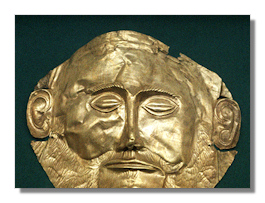
The Internet's Premier Classical Music Source
Related Links
- Latest Reviews
- More Reviews
-
By Composer
-
Collections
DVD & Blu-ray
Books
Concert Reviews
Articles/Interviews
Software
Audio
Search Amazon
Recommended Links
Site News
 Concert Review
Concert Review
Darius Milhaud

The Oresteia of Aeschylus
Sophie Delphis, speaker
Julianna Di Giacomo, soprano
Lori Phillips, soprano
Brenda Rae, soprano
Kristin Eder, mezzo-soprano
Tamara Mumford, mezzo-soprano
Jennifer Lane, contralto
Dan Kempson, baritone
Sidney Outlaw, baritone
Choirs of the University Musical Society
University of Michigan Percussion Ensemble
University of Michigan Symphony Orchestra/Kenneth Kiesler
North American Premiere, recorded for Naxos Records
Ann Arbor, Michigan, Hill Auditorium, 4 April 2013
Now available on Naxos 8.660349-51
Hill Auditorium has long been the preferred venue in Ann Arbor for great art. Many of the world's finest ensembles – 2012-2013 featured the New York Philharmonic and Chicago Symphony – have performed here to praise and admiration. The magnificent venue holds nearly 5,000 patrons, and is recognized as a superior sonic and architectural experience. Celebrating 100 years is special anywhere, but in this great Albert Kahn masterpiece it was fitting to celebrate on a grand scale. To the credit of accomplished conductor Kenneth Kiesler, and composer-in-residence William Bolcom, the choice was both unfamiliar and overwhelming. This massive, sprawling, intensely scored extravaganza delivered the necessary fanfare of celebration.
For many music lovers, I would wager that Milhaud is hardly common fare. Further I would guess that seeing college students take on this huge mythological tale might raise eyebrows. But the U of M forces are easily some of the finest of their kind in the world, having worked with great artists in great venues, they fear little from their professional counterparts. As for the composer, his distinctly modern sound nonetheless pays homage to his great French predecessors. Bolcom, who studied with Milhaud, was instrumental in getting this work on the stage. All in attendance were luckier for it. Sometimes deeply moving, sometimes deeply savage, but always faithful to the text and the composer's musical style, the work dazzles as much as it confuses.
The story itself is somewhat difficult to follow – technical difficulties with the English subtitles hardly helped – but in short, Agamemnon is murdered by his wife at the conclusion of the Trojan War. She is then killed by her own son, Orestes, to avenge the father's death. Apollo is involved, but this doesn't stop the sprit of the mother from enlisting the dreadful Furies to torment him for eternity. Orestes then calls on both Apollo and Pallas Athena to intercede on his behalf. The Furies and Apollo exchange testimony for the people of Athens. Unable to decide, the people give Athena the final vote, and she rules in Orestes favor. Enraged, the Furies threaten the destruction of Athens, but in her wisdom, the great Goddess soothes them by making them minor deities as opposed to hated foes. All judged and accounted for, there is rejoicing.
This takes three hours, and forces of over 300 singers and players. It includes chant, spoken dialogue, and tons of percussion. Yet it also Milhaud an absolute master of his idiom. Composed over a ten-year span, the work is stunningly cogent and reasonably accessible. It's a musical drama, and a very, very good one. The various soloists have a lot to do, with difficult vocal writing interspersed with a genuine need to convey the weight of the decisions at hand, This polytonal, dense work also requires great stamina from the combined choruses. It's a difficult, difficult piece, full of differing musical ideas and styles, and still one great conception.
Kenneth Kiesler has every right to be proud of his exceptional forces. Working with a huge crowd of soloists, instrumentalists, and singers, he kept everything flowing naturally from first bar to last. There were few if any mistakes. Everything was carefully rehearsed and balanced, though I suspect that the eventual Naxos recording will better serve the various solo singers. As I stated previously, the forces assembled are some of the best that any campus has to offer. It is a true testament to the musical and artistic range of UMS, the vision of Kiesler and Bolcom, and the means to execute it so well that this night was not simply a tribute to great art. It was an experience, and I am proud to say I was there.
Copyright © 2013, Brian Wigman












